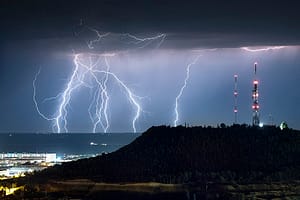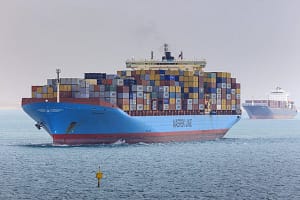Major airlines such as British Airways and easyJet top Christmas flight disruption leaderboard, with hundreds of flight delays and cancellations on the cards.
Law firm Bott and Co warns that passengers could be in it for the long haul during the holidays and wants people to be aware that they could be entitled to hundreds of pounds in compensation.
Flash flooding, industrial action and an influx in travellers will no doubt contribute to a disappointing journey for some this Christmas.
Using data provided by Lennoc Flight Intelligence, Bott and Co ranks airlines based on the number of flight delays and cancellations last year during the 12 days of Christmas.
Flagship carrier British Airways claimed the top spot, with a total of 56 disrupted flights. 42 were delayed and 14 were cancelled all together! That’s over 7,000 passengers travelling with BA whose Christmas spirit may have been dampened. The airline was named as one of the worst airlines for food, drink and value for money in a recent Which? survey.
EasyJet passengers were the second worst affected with a total of 55 delayed and cancelled flights. EasyJet had fewer cancellations than BA but more delayed flights.
Flybe joined them in having more than 50 flights subject to delays and cancellations while other well-known airlines such as Air France, Wizz Air and Logan air fared better with less than 10 disrupted flights each.
| Airlines with most disruption 25 DEC 2018 – 05 JAN 2019 | ||||
| Rank | Airline | Total | Cancellations | Delays |
| 1 | British Airways | 56 | 14 | 42 |
| 2 | easyJet | 55 | 9 | 46 |
| 3 | FlyBE | 51 | 28 | 23 |
| 4 | Thomson | 36 | 4 | 32 |
| 5 | Ryanair | 31 | 6 | 25 |
| 6 | Swiss | 14 | 14 | 0 |
| 7 | Thomas Cook Airlines (no longer in operation) | 11 | 3 | 8 |
| 8 | Logan Air | 9 | 6 | 3 |
| 9 | Wizziar | 8 | 4 | 4 |
| 10 | Air France | 5 | 4 | 1 |
David Bott, Senior Partner at Bott and Co said: “People often make special plans and there is a general increase in travellers over the holidays. With this in mind and circumstances such as winter weather and airline crew holiday and sickness affecting flight times, airlines should have contingency plans in place.
It’s also important that people know their rights if they are affected by a delayed flight but it’s surprising how many are still unaware.
Under EU Regulation 261/2004, a passenger is entitled to compensation of up to €600 if their flight is delayed by more than three hours and is not caused by extraordinary circumstances. Missed connections within and outside of the EU and flight cancellations made within 14 days of departure are also claimable should they meet the qualifying criteria.”
The data also revealed the airports with the most departing flights that were delayed or cancelled in December 2018.
London Gatwick stood out as by far the airport with the most incidents, something Bott and Co attribute largely to the drone chaos. The capital’s airport had 1,075 flights delays or cancelled.
324 flights leaving London Heathrow suffered setbacks while Amsterdam’s Schiphol airport came in third place with 171 flights disrupted.
| Airports with most incidents during December 2018 | ||
| Rank | Airport | Dec-18 |
| 1 | London Gatwick | 1075 |
| 2 | London Heathrow | 324 |
| 3 | Amsterdam | 171 |
| 4 | Manchester | 158 |
| 5 | Glasgow | 141 |
| 6 | Birmingham | 124 |
| 7 | Edinburgh | 101 |
| 8 | London City | 95 |
| 9 | Geneva | 76 |
| 10 | Dublin | 72 |
Passengers flying from Dublin, Geneva and London City were the least affected.
As well as monetary compensation, EU regulation provides a blanket of care and assistance rules that airlines must adhere to if passengers are stuck at the airport and have been delayed by more than two hours (depending on the distance of the flight).
Food and drink vouchers should be provided as well as being entitled to a telephone call and an email. Accommodation must be provided if passengers are delayed overnight and transport to and from the accommodation and the airport must also be provided.
Although reasons for delays and cancellations differ, the most common one that Bott and Co comes across is a technical fault. However at this time of year, bad weather comes into question frequently.
It is a common misconception that bad weather is always an extraordinary circumstance, which would stop the airlines having to pay compensation. However delays caused by weather conditions that are not considered ‘freakish’ or ‘wholly exceptional’ are indeed covered by the regulation.
In a recent survey, the most popular excuse given by airlines to not pay compensation was bad weather conditions (40%), followed by technical problems (23%). Other excuses given were crew/staff sickness, delay on a previous flight and crew out of allocated working hours.
The firm would urge any passengers affected by a delayed or cancelled flight to check to see if they are eligible to claim compensation.
Bott and Co have acted for hundreds of thousands of passengers since 2013, and have successfully claimed millions in compensation, often where airlines had previously rejected claims.






Leave a Comment